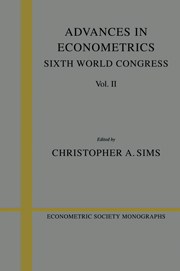Book contents
- Frontmatter
- Part I Labour supply
- Part II Computation for stochastic equilibrium
- 3 Simulation analysis of dynamic stochastic models: applications to theory and estimation
- 4 Estimation of dynamic structural models, problems and prospects: discrete decision processes
- 5 Dynamic structural models, problems and prospects: mixed continuous discrete controls and market interactions
- Part III Econometrics of finance
- Part IV Development economics
4 - Estimation of dynamic structural models, problems and prospects: discrete decision processes
Published online by Cambridge University Press: 05 January 2013
- Frontmatter
- Part I Labour supply
- Part II Computation for stochastic equilibrium
- 3 Simulation analysis of dynamic stochastic models: applications to theory and estimation
- 4 Estimation of dynamic structural models, problems and prospects: discrete decision processes
- 5 Dynamic structural models, problems and prospects: mixed continuous discrete controls and market interactions
- Part III Econometrics of finance
- Part IV Development economics
Summary
INTRODUCTION
This is the first in a two-part survey of recent developments in the rapidly growing literature on methods for solving and estimating dynamic structural models. Part I focusses on discrete decision processes (DDP), i.e., problems where the decision variable is restricted to a countable set. Most of this part deals with single-agent problems, though I do conclude by sketching a framework for inference of discrete dynamic games. Part II, by Ariel Pakes, considers extensions to mixed continuous discrete decision processes (MCDP), i.e., processes where some of the components of the decision variable can take on a continuum of values. Part II provides more extensive coverage of recent developments in estimation of dynamic multiagent models. We have tried to make the parts relatively self contained, so that readers can feel free to skip to the sections that interest them. Both parts of the survey are restricted to problems formulated in discrete time, and, as a result, the words 'discrete' and 'continuous' will refer to the control rather than the time variable.
I presume that readers are familiar with recent surveys of discrete decision processes by Eckstein and Wolpin (1989a) and Rust (1988a and 1994), and focus on issues that are not covered in these surveys. In keeping with the title, section 2 begins with some general comments on (my view of) the problems with the current literature on estimation of dynamic structural models. In section 3 I define the subclass of DDPs and in section 4 I discuss the identification problem. The identification problem can lead to potentially serious questions about the credibility of a structural approach to policy analysis.
- Type
- Chapter
- Information
- Advances in EconometricsSixth World Congress, pp. 119 - 170Publisher: Cambridge University PressPrint publication year: 1994
- 48
- Cited by



